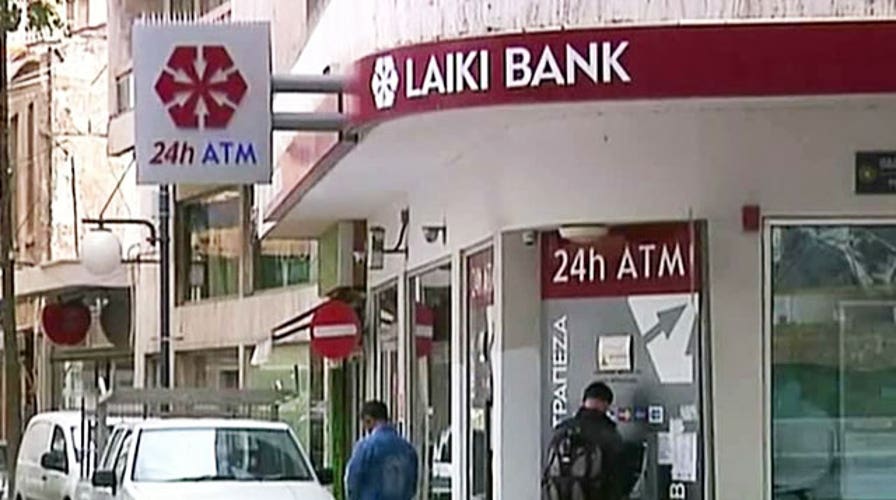Officials in Cyprus are rushing to find a new plan to avoid bankruptcy after its parliament rejected a plan to fund a bailout package by taking up to 10 percent of people's bank savings.
ATMs have been dispensing cash and debit and credit cards have been working, so Cypriots have not faced any immediate cash shortage for day-to-day living. But banks will remain closed Thursday and Friday, a government official, speaking on condition of anonymity, told Reuters. Banks will also be closed on Monday, which is a public holiday in the island nation.
Tuesday's decisive rejection of the plan to take a slice of all deposits above 20,000 euros ($25,888) has left the country's bailout in question. Without the bailout, the Cypriot banking sector would collapse, devastating the country's economy and potentially causing it to leave the euro.
That could roil global financial markets as well as endanger deposits in the country even further.
Government spokesman Christos Stylianides said a meeting was underway at the central bank to discuss an alternative plan for raising funds, but also for reducing the 5.8 billion euros ($7.5 billion) that must be found domestically.
President Nicos Anastasiades met with the representatives of his country's potential creditors — the International Monetary Fund, European Central Bank and European Commission — but issued no statement on the result. The three, known as the troika, must sign off on any Plan B the Cypriots come up with if it is to be approved as part of the bailout.
The ECB, which is keeping the Cypriot banking sector alive by allowing the central bank to extend emergency support, has said it would end that aid if there was no bailout deal and it was clear the banks had no hope of becoming solvent again.
For now, the ECB says it will continue extending its support. But experts note that if there's no bailout deal within days, the ECB will have to end it.
Under the initial bailout plan conceived in Brussels last weekend, other eurozone countries and the IMF would give Cyprus 10 billion euros ($12.9 billion) in rescue loans if the country raised 5.8 billion euros ($7.5 billion) through the bank deposit seizures.
The plan was initially to take 6.75 percent of deposits up to 100,000 euros and 9.9 percent on those above that threshold. That caused outrage, leading the government to propose an amended version that would have spared deposits up to 20,000 euros. But that new plan also failed to win over Cypriot lawmakers.
In a two-pronged approach to the crisis, Finance Minister Michalis Sarris was in Moscow for meetings with his Russian counterpart. Russia could play a key role in any alternative package that may emerge. Russians are believed to account for just under a third of Cyprus's 68 billion euro bank deposits.
"We will be here until some kind of agreement is reached," Sarris said.
In Nicosia, residents waited anxiously to see what lay in store for them.
Avetis Bahcecian has been running his Armenian restaurant in Nicosia for years. Now, with the uncertainty swirling around Cyprus, he's worried about his business.
"Whatever they do, they have to do it quickly because this uncertainty is hurting business," the 41-year-old said as he kneaded dough to make lahmacun, a traditional Armenian pizza-style food. "Our business is down by 40 percent in the last couple days."
A government official said an alternative plan to raise the 5.8 billion euros had been drafted and was to be presented to the troika, most likely on Wednesday. The plan would raise money from domestic sources, including pension plans and subsidiaries of foreign banks active in Cyprus.
One of those domestic sources may be the country's influential Orthodox church.
Its head, Archbishop Chrysostomos II, said he would put the church's assets at the country's disposal, saying the church was willing to mortgage its assets to invest in government bonds. The church has considerable wealth, including property, stakes in a bank and a brewery.
"The wealth of the church is at the disposal of the country," Chrysostomos said after meeting with Anastasiades Wednesday morning.
The Associated Press contributed to this report.

